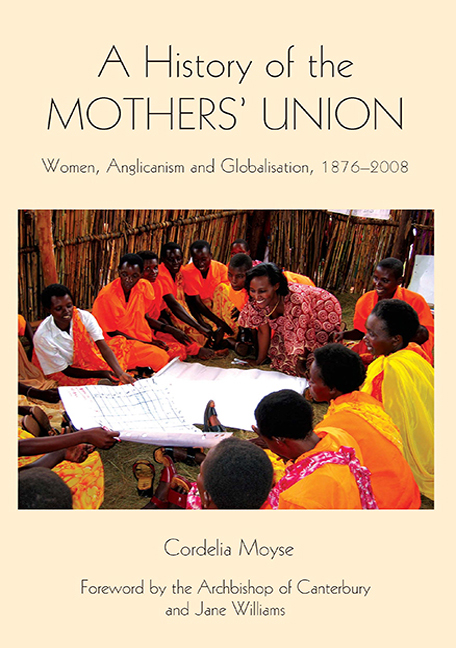Book contents
- Frontmatter
- Contents
- Dedication
- List of Illustrations
- Foreword by the Archbishop of Canterbury and Jane Williams
- Acknowledgements
- Abbreviations
- Introduction
- Part I 1876–1909
- Part II 1910–1944
- Part III 1945–1974
- Part IV 1975–2008
- Conclusion
- Appendix 1 Text of early membership cards
- Appendix 2 Development of the Mothers' Union prayer
- Appendix 3 Midday prayers (original)
- Appendix 4 Development of the objects
- Appendix 5 Biographical notes on central and worldwide presidents
- Bibliography
- Index
- Miscellaneous Endmatter
Foreword by the Archbishop of Canterbury and Jane Williams
Published online by Cambridge University Press: 29 April 2017
- Frontmatter
- Contents
- Dedication
- List of Illustrations
- Foreword by the Archbishop of Canterbury and Jane Williams
- Acknowledgements
- Abbreviations
- Introduction
- Part I 1876–1909
- Part II 1910–1944
- Part III 1945–1974
- Part IV 1975–2008
- Conclusion
- Appendix 1 Text of early membership cards
- Appendix 2 Development of the Mothers' Union prayer
- Appendix 3 Midday prayers (original)
- Appendix 4 Development of the objects
- Appendix 5 Biographical notes on central and worldwide presidents
- Bibliography
- Index
- Miscellaneous Endmatter
Summary
The Mothers’ Union is one of the most distinctive aspects of the Anglican ‘brand’ throughout the world; it has even been described – not quite in jest – as the fifth Instrument of Communion for the Anglican family (along with the Archbishop of Canterbury, the Lambeth Conference, the Primates’ Meeting and the Anglican Consultative Council). Yet for many people outside the Church and probably quite a few within it, the Mothers’ Union is part of a cluster of stereotypes, along with pale young curates and angelic but unruly choristers, reflecting a quaint but long-outdated model of church life. It would be dangerously easy to think that it must be associated with unchallenged certainties about the expected models of family life and so with complacently unrealistic approaches to the problems of the contemporary world.
This excellent and exhaustively researched history disposes of any such misconception. From the beginning, the MU has opened up new territory for the ministry of lay women in the Anglican Communion; indeed, it is the most influential and widespread lay movement in the churches of the Communion, and probably among the most active lay groups in any Christian denomination. The vision of its first founders in England may now look a little tame to the casual observer; but Dr Moyse shows very clearly how the challenge to women to play a more active role in fostering the Christian integrity of both the home and the local congregation was anything but routine or conventional at the time. More and more, the MU became a major contributor to the education of women in the UK about Christian identity and Christian ethics and, at least as significantly, about the enormous diversity of the worldwide Church. In recent decades, it has had a crucial role in countless local parishes in Britain as the channel by which firsthand news of communities abroad under great pressure is brought to people in the pews. It has done an extraordinary job in keeping the congregations of the Church of England conscious of their international links and responsibilities. And, as this book chronicles very fully, it has wrestled honestly and sometimes painfully with how it should respond both faithfully and realistically to new and apparently less stable patterns of family life, especially to the growing prevalence of divorce and cohabitation.
- Type
- Chapter
- Information
- A History of the Mothers' UnionWomen, Anglicanism and Globalisation, 1876–2008, pp. ix - xPublisher: Boydell & BrewerPrint publication year: 2009



